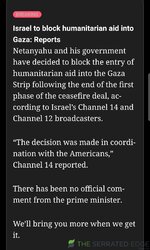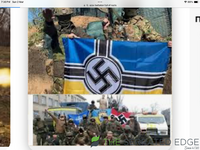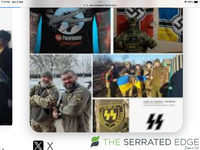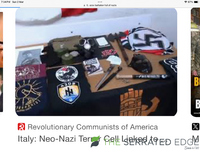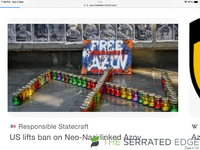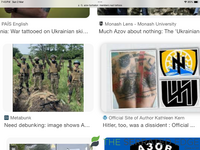as far as what America will or won't do if we were attacked by China , you & i have no idea one way or the other , because you have no faith in them or i do have faith in them makes no difference whether they will or won't support Australia , i'm going off our support of them in the middle east confrontations in the past , you seem to be going off " i don't like them " which seems more your opinion which your completely entitled to
Ukraine giving up nukes is much bigger than your making out it is & go's way back to the early 90's
if your prepared to take the time here is how i understand that situation which i'll c & p here , you can see there are allot more moving parts to your statement & of cause this info does not show all the backroom deals & discussions that i'm sure were had by all parties involved
this post is not an i'm right your wrong & America / Russia are angles statement , it just can't be summed up as you have in a short sentence or 2
At the time of Ukraine’s independence from the Soviet Union in 1991, Ukraine held the third largest nuclear arsenal in the world, including an
estimated 1,900 strategic warheads, 176 intercontinental ballistic missiles (ICBMs), and 44 strategic bombers. By 1996, Ukraine had returned all of its nuclear warheads to Russia in exchange for economic aid and security assurances, and in December 1994, Ukraine became a non-nuclear weapon state-party to the 1968 nuclear Nonproliferation Treaty (
NPT). The last strategic nuclear delivery vehicle in Ukraine
was eliminated in 2001 under the 1991 Strategic Arms Reduction Treaty (
START). It took years of political maneuvering and diplomatic work, starting with the
Lisbon Protocol in 1992, to remove the weapons and nuclear infrastructure from Ukraine.
1990 Declaration of Sovereignty
Partly in an effort to gain international recognition, Ukraine’s pre-independence movement supported efforts to join the NPT as a non-nuclear weapon state. With its Declaration of Sovereignty on July 16, 1990, Ukraine
pledged “not to accept, produce, or acquire nuclear weapons." However, despite this public commitment, Ukrainian politicians were not entirely
united by the idea. Some felt that Russia was a still a threat and that they should keep the weapons as a deterrent.
1991 Minsk Agreement on Strategic Forces
With the dissolution of the Soviet Union, the Commonwealth of Independent States signed the Minsk Agreement on December 30, 1991, agreeing that the Russian government would be given charge of all nuclear armaments. However, as long as the weapons remained in Belarus, Ukraine, and Kazakhstan, the governments of those countries would have the right to veto their use. The target date for dismantling the weapons
was set for the end of 1994.
1992 Lisbon Protocol
Ukraine signed the Lisbon Protocol on May 23, 1992. The protocol sought to return the nuclear weapons in Belarus, Kazakhstan, and Ukraine to Russia. All states were to join START and the NPT. However, within Ukraine, there was little motion towards the ratification of START, joining the NPT, or overall denuclearization. The protocol required that Ukraine adhere to the NPT as quickly as possible, but it gave the country up to seven years to follow through.
By late 1992, the Ukrainian parliament was
vocalizing more pro-nuclear views. Some believed that Ukraine was entitled to at least temporary nuclear weapon status. Perhaps optimistically, the U.S. government
promised Ukraine $175 million in dismantlement assistance. Instead, the Ukrainian government began implementing administrative management of the nuclear forces and claimed ownership of the warheads.
In late April 1993, 162 Ukrainian politicians signed a statement to add 13 preconditions for ratification of START, frustrating the ratification process. The preconditions required security assurances from Russia and the United States, foreign aid for dismantlement, and compensation for the nuclear material. Additionally, they stated that Ukraine would dismantle only 36 percent of its delivery vehicles and 42 percent of its warheads, leaving the rest under Ukrainian control. Russia and the United States criticized these demands, but Ukraine did not budge. In May 1993, the United States said that if Ukraine were to ratify START, Washington would provide more financial assistance. This began subsequent discussions between Ukraine, Russia, and the United States over the future of Ukrainian denuclearization.
1993 Massandra Accords
Ukrainian and Russian officials reached a set of agreements, including protocols on nuclear weapons dismantlement, procedure, and terms of compensation. However, the two sides could
not agree on the final document, and the summit ultimately failed.
1994 Trilateral Statement
The Massandra Accords set the stage for the ultimately successful trilateral talks. As the United States mediated between Russia and Ukraine, the three countries signed the Trilateral Statement on January 14, 1994. Ukraine committed to full disarmament, including strategic weapons, in exchange for economic support and security assurances from the United States and Russia.
Ukraine agreed to transfer its nuclear warheads to Russia and accepted U.S. assistance in dismantling missiles, bombers, and nuclear infrastructure. Ukraine’s warheads would be dismantled in Russia, and Ukraine would
receive compensation for the commercial value of the highly enriched uranium. Ukraine
ratified START on February 3, 1994, repealing its earlier preconditions, but it would not accede to the NPT without further security assurances.
1994 Budapest Memorandum on Security Assurances
To solidify security commitments to Ukraine, the United States, Russia, and the United Kingdom signed the Budapest Memorandum on Security Assurances on December 5, 1994. A political agreement in accordance with the principles of the Helsinki Accords, the memorandum included security assurances against the threat or use of force against Ukraine’s territory or political independence. The countries promised to respect the sovereignty and existing borders of Ukraine. Parallel memorandums were signed for Belarus and Kazakhstan as well. In response, Ukraine officially acceded to the NPT as a non-nuclear weapon state on December 5, 1994. That move met the final condition for ratification of START, and on the same day, the five START states-parties exchanged instruments of ratification, bringing the treaty into force.
2009 Joint Declaration by Russia and the United States
Russia and the United States released a joint statement in 2009 confirming that the security assurances made in the 1994 Budapest Memorandum would still be valid after START expired in 2009.
2014 Russian Annexation of Crimea
Following months of political unrest and the abrupt departure of Ukrainian President Viktor Yanukovych, Russian troops entered the Crimean peninsula of Ukraine in March 2014. On March 18, over the protests of the acting government in Kiev, the UN Security Council, and Western governments, Russia declared the annexation of Crimea. The United States, the United Kingdom, and Ukraine called the action a blatant violation of the security assurances in the 1994 Budapest Memorandum. However, according to the
Russian Foreign Ministry, “the security assurances were given to the legitimate government of Ukraine but not to the forces that came to power following the coup d'etat.”






